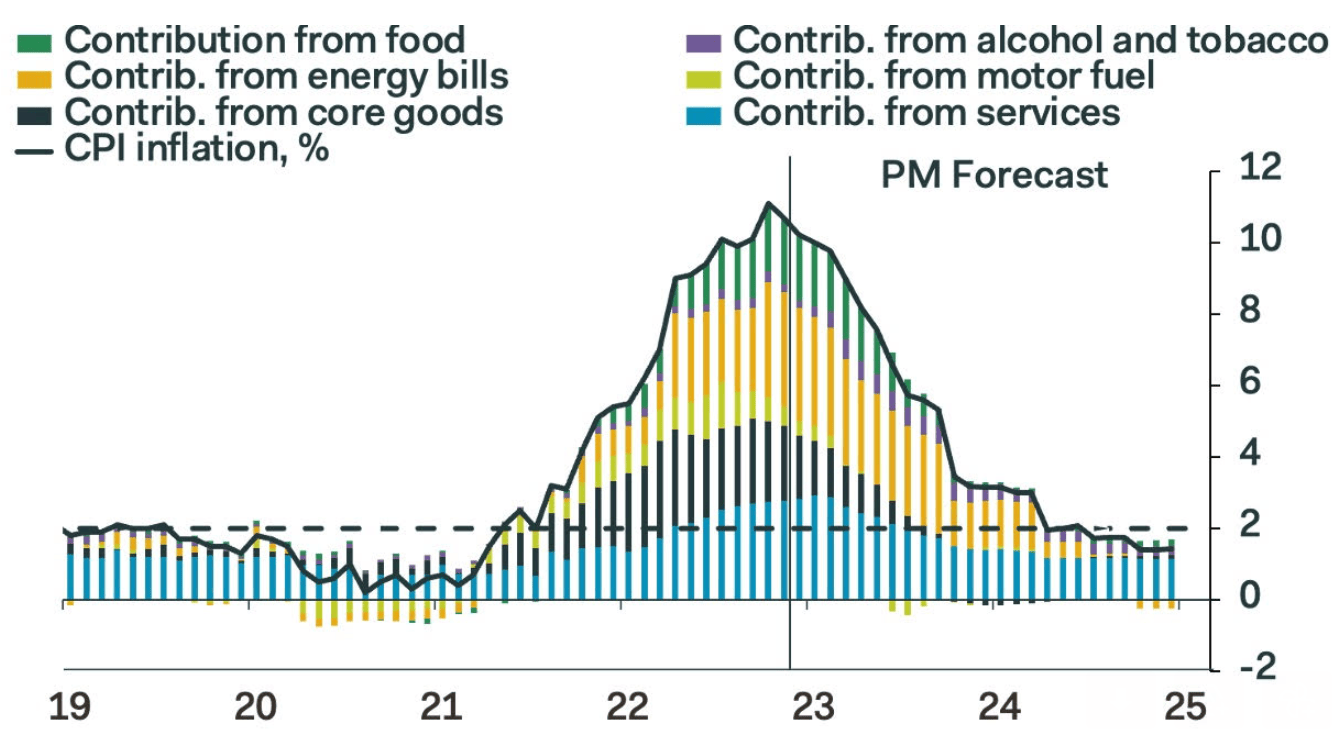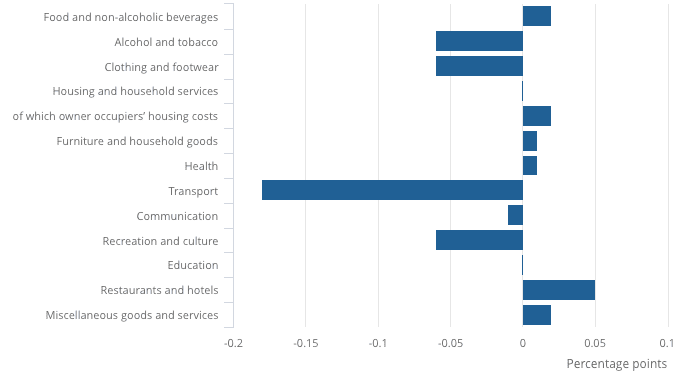Lower Inflation is Good the Pound
- Written by: Gary Howes
"At last! A clear slowing in the rate of core price rises" - Pantheon Macroeconomics.

Image © Adobe Stock
UK CPI inflation came in below analyst estimates when released mid-week, a development that could prove supportive of the British Pound say analysts.
The Pound was supported near recent highs after UK headline CPI inflation rose by 10.7% year-on-year in November according to the ONS, an outcome that was less than the 10.9% expected by markets and October's 11.1%.
Inflation increased 0.4% over the month, which was below the 0.6% consensus was looking for and represents a sharp decline on October's 2.0% increase.
"The fall in inflation last month supports our view that we’ve likely passed its peak. We expect inflation to continue falling gradually over the year ahead, as global price pressures ease and an economic downturn takes some of the heat out of price setting," says Alpesh Paleja, CBI Lead Economist.
The Pound to Euro exchange rate (GBP/EUR) retreated from pre-release highs to 1.1622 at the time of writing, the Pound to Dollar exchange rate (GBP/USD) went back to 1.2356.
Compare Currency Exchange Rates
Find out how much you could save on your international transfer
Estimated saving compared to high street banks:
£2,500.00
Free • No obligation • Takes 2 minutes
Core CPI - which gives a better indication of true domestic inflationary pressure as it excludes fuel and food - rose 0.3% over the month, below expectations for a 0.5% rise and October's 0.7% increase. This takes the annual rate of core CPI to 6.3%, down on expectations (6.5%) and the previous month (6.5%).
"At last! A clear slowing in the rate of core price rises," says Samuel Tombs, Chief UK Economist at Pantheon Macroeconomics. "The decline in CPI inflation in November will relieve the MPC, after October’s print exceeded its expectations by 0.2pp, and suggests that the peak rate now lies firmly in the past."
The softer-than-expected readings could take convince the Bank of England they can slow down the pace at which they raise interest rates.
Typically this would in turn lower UK bond yields and act as a drag on the UK currency as the relative attractiveness of UK bonds on the international market declines.
Above; UK inflation has passed its peak and should trend lower according to Pantheon Macroeconomics' forecasts. Image courtesy of Pantheon Macroeconomics.
While the textbook says lower inflation should result in a weaker currency, this might not hold in the current stagflationary environment: the UK economy is set for a period of decline owing to high prices and this weak growth environment is fundamentally unsupportive of the Pound.
Therefore, easing inflation could be supportive of the economic outlook, and the Pound.
"Lower inflation is often associated with weaker currency performance in developed markets – a sign that the economy is faltering and a less hawkish (or more dovish) central bank stance may be required," says Dominic Bunning, Head of European FX Research, HSBC Bank plc.
However, "GBP's relationship with inflation may have shifted a little in the most recent cycle," he explains. "If inflation has now peaked and reverts to a slower pace, while wage gains remain solid, it could point to a more resilient consumer story later in 2023 than many currently expect. Lower inflation also takes some pressure off the BoE to hike more aggressively and creates less risk of an even deeper UK recession."
HSBC is constructive on Sterling in 2023.
Following the data, GBP/EUR spot was at 1.1622, approximate bank payment rates at 1.1391, competitive cash and holiday money providers at 1.1504 and competitive international payment providers at 1.1588. For GBP/USD, the various respective guidance rates were: 1.2349, 1.2102, 1.2214 and 1.2312.
Above: The drivers of UK inflation. Source: ONS.
Inflation remains elevated and recent data confirm the labour market remains tight, which should ensure wage pressures remain elevated. The Bank of England will therefore welcome the data but will likely say on Thursday that further rate hikes are required.
"Costs and price pressures will likely remain very high in the near-term, putting continued pressure on vulnerable households and businesses," says Paleja.
Nevertheless, there is a sense that the inflation peak has been navigated.
"Looking ahead, CPI inflation should continue to decline over the coming months, assisted by the recent fall in oil prices, which looks set to mean that motor fuel’s contribution to the headline rate falls by a further 0.15pp in December. In addition, global agricultural commodity prices and producer price data suggest that food CPI inflation likely has peaked and will fall sharply in 2023," says Tombs.
From a currency perspective, Sterling heads into the week's next major events with wind in it sails, having recently reached six-month highs against the Dollar and occupying the upper end of its relatively narrow range against the Euro.
Eyes now turn to the Federal Reserve decision on Wednesday night and Thursday's Bank of England and European Central Bank policy updates.
All are tipped to hike by 50 basis points, but offer divergent guidance as to the number of future rate hikes required to bring inflation down.
It is this guidance that will ultimately have a bearing on currency markets.
"The pound’s reaction to the data has been quite muted, which is not surprising given the wait-and-see approach ahead of today’s FOMC risk event and since the inflation figures do not suggest a different outcome for tomorrow’s Bank of England meeting," says Francesco Pesole, foreign exchange strategist at ING Bank.
(If you are looking to protect or boost your international payment budget you could consider securing today's rate for use in the future, or set an order for your ideal rate when it is achieved, more information can be found here.)
Compare Currency Exchange Rates
Find out how much you could save on your international transfer
Estimated saving compared to high street banks:
£2,500.00
Free • No obligation • Takes 2 minutes






